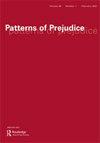The colour of the transcendental deduction
IF 0.8
2区 社会学
Q4 ETHNIC STUDIES
引用次数: 0
Abstract
ABSTRACT LeBlanc’s article interprets Kant’s transcendental deduction of the categories in the Critique of Pure Reason (1781, 1787) in light of his texts on race. It shows that, when Kant’s less canonical work on race is considered, his racial neutrality in this so-called ‘first critique’ becomes flawed. The first part of LeBlanc’s argumentation suggests that Kant’s monogenetic conception of the human species is compatible with the universalism of the transcendental deduction, and explains how this is largely supported by the fact that Kant himself diminished the importance of his work on race. It is in this broader context that LeBlanc concludes this first section by asserting that the categories of the human understanding, as explained in the transcendental deduction, would be applicable to the whole human species if we followed Kant’s logic. The second part of this paper starts from the Kantian idea that only white European peoples can produce science. It demonstrates that this Kantian idea broadens the function of the transcendental deduction in the first critique with regard to the history of modern science—namely, to give legitimacy to Newton’s science—to exclude non-Whites from the work of science in general. It is thus the juxtaposition of Kant’s analysis of modern European scientific culture on the one hand, and his account of human races on the other, that indicates a possible implicit racism in Kant’s Critique of Pure Reason. The colour of the transcendental deduction in its function of scientific legitimation is thus revealed to be potentially white, although LeBlanc’s article still admits that other interpretive perspectives are reasonable and possible. His conclusion aims to make suggestions about the future of Kant studies in a global context in which postcoloniality can no longer be avoided, and the work of scholars such as Robert Bernasconi and Charles W. Mills, among others, should be taken as crucial.先验演绎的色彩
本文结合康德关于种族的文本,阐释了康德在《纯粹理性批判》(1781、1787)中对范畴的先验演绎。这表明,当考虑到康德关于种族的不那么规范的著作时,他在所谓的“第一批判”中的种族中立就变得有缺陷了。勒布朗论证的第一部分表明,康德关于人类物种的单基因概念与先验演绎的普遍主义是相容的,并解释了康德自己贬低了他关于种族的工作的重要性这一事实是如何在很大程度上支持这一观点的。正是在这个更广阔的背景下,勒布朗在第一节的结论中断言,如果我们遵循康德的逻辑,先验演绎所解释的人类知性的范畴将适用于整个人类。本文第二部分从康德认为只有欧洲白人才能产生科学的观点出发。它证明了康德的这种观念扩大了先验演绎在第一批判中对现代科学史的作用,即赋予牛顿的科学以合法性,将非白人排除在一般的科学工作之外。因此,康德对现代欧洲科学文化的分析与他对人类种族的描述并置在一起,表明康德的《纯粹理性批判》中可能隐含着种族主义。因此,先验演绎在其科学正当化功能中的色彩被揭示为潜在的白色,尽管LeBlanc的文章仍然承认其他解释视角是合理和可能的。他的结论旨在对康德研究在全球背景下的未来提出建议,在后殖民主义无法避免的背景下,罗伯特·贝纳斯科尼和查尔斯·w·米尔斯等学者的工作应该被视为至关重要的。
本文章由计算机程序翻译,如有差异,请以英文原文为准。
求助全文
约1分钟内获得全文
求助全文
来源期刊

Patterns of Prejudice
Multiple-
CiteScore
2.50
自引率
0.00%
发文量
11
期刊介绍:
Patterns of Prejudice provides a forum for exploring the historical roots and contemporary varieties of social exclusion and the demonization or stigmatisation of the Other. It probes the language and construction of "race", nation, colour, and ethnicity, as well as the linkages between these categories. It encourages discussion of issues at the top of the public policy agenda, such as asylum, immigration, hate crimes and citizenship. As none of these issues are confined to any one region, Patterns of Prejudice maintains a global optic, at the same time as scrutinizing intensely the history and development of intolerance and chauvinism in the United States and Europe, both East and West.
 求助内容:
求助内容: 应助结果提醒方式:
应助结果提醒方式:


